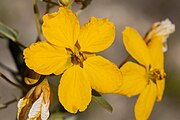Comprehensive Description
(
englanti
)
tarjonnut North American Flora
Earleocassia roemeriana (Scheele) Britton
Cassia Roemeriana Scheele, Linnaea 21: 457. 1848.
Herbaceous; stem erect, 3-5 dm. high, simple or branched, somewhat angled, puberulent. Stipules linear, persistent; petiole shorter than the leaflets; leaflets 1 pair, lanceolate, 3-6 cm. long, 12 mm. wide or less, acute or acutish, more or less appressed-pubescent on both sides; gland between the leaflets narrow; inflorescence longer than the leaves, 2-5-flowered; sepals sparingly pubescent, 6-7 mm. long; petals about twice as long as the sepals; ovary pubescent; legume narrowly oblong, compressed, 2-3 cm. long, 5-6 mm. wide, short-tipped, sparingly pubescent.
Type locality: On the Guadalupe River. Texas.
Distribution: Oklahoma, Texas, and New Mexico to Nuevo Le6n and Coahuila.
- bibliografinen lainaus
- Nathaniel Lord Britton and Joseph Nelson Rose. 1928. (ROSALES); MIMOSACEAE. North American flora. vol 23(1). New York Botanical Garden, New York, NY
Physical Description
(
englanti
)
tarjonnut USDA PLANTS text
Perennial, Herbs, Stems woody below, or from woody crown or caudex, Taproot present, Stems erect or ascending, Stems less than 1 m tall, Stems solid, Stems or young twigs sparsely to densely hairy, Leaves alternate, Leaves petiolate, Extrafloral nectary glands on petiole, Stipules inconspicuous, absent, or caducous, Stipules setiform, subulate or acicular, Stipules persistent, Stipules free, Leaves compound, Leaves even pinnate, Leaf or leaflet margins entire, Leaflets opposite, Leaflets 2, Leaves hairy on one or both surfaces, Flowers in axillary clusters or few-floweredracemes, 2-6 flowers, Inflorescences racemes, Inflorescence axillary, Inflorescence terminal, Bracts very small, absent or caducous, Flowers actinomorphic or somewhat irregular, Calyx 5-lobed, Calyx glabrous, Calyx hairy, Petals separate, Petals orange or yellow, Stamens 9-10, Fertile stamens 6-8, Stamens heteromorphic, graded in size, Stamens completely free, separate, Filaments glabrous, Anthers opening by basal or terminal pores or slits, Style terete, Fruit a legume, Fruit stipitate, Fruit unilocular, Fruit tardily or weakly dehiscent, Fruit elongate, straight, Fruit oblong or ellipsoidal, Fruit or valves persistent on stem, Fruit exserted from calyx, Fruit compressed between seeds, Fruit glabrous or glabrate, Fruit hairy, Fruit 11-many seeded, Seed with elliptical line or depression, pleurogram, Seeds ovoid to rounded in outline, Seed surface smooth, Seeds olive, brown, or black, Seeds with appendage - aril, caruncle, funiculus, or strophiole.
Senna roemeriana: Brief Summary
(
englanti
)
tarjonnut wikipedia EN
Senna roemeriana, the twoleaf senna, is a species of flowering plant in the family Fabaceae, native to the US states of New Mexico and Texas, and to northern Mexico. A perennial of limestone soils and typically 18 in (46 cm) tall, it is toxic to livestock, particularly goats and sheep, but they avoid consuming it with proper range management.

Close-up of flower
- lisenssi
- cc-by-sa-3.0
- tekijänoikeus
- Wikipedia authors and editors


